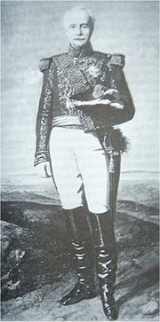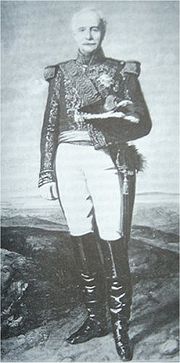
Achille Baraguey d'Hilliers
Encyclopedia

Marshal of France
The Marshal of France is a military distinction in contemporary France, not a military rank. It is granted to generals for exceptional achievements...
and politician.
Baraguey d'Hilliers was born in Paris
Paris
Paris is the capital and largest city in France, situated on the river Seine, in northern France, at the heart of the Île-de-France region...
, the son of the French revolutionary general Louis Baraguey d'Hilliers
Louis Baraguey d'Hilliers
thumbLouis Baraguey d'Hilliers was a French Army general who fought in the French Revolutionary Wars and the Napoleonic Wars. He was the father of Achille Baraguey d'Hilliers, a Marshal of France.-French Revolution:...
. He was educated at the Prytanée National Militaire
Prytanée National Militaire
The Prytanée National Militaire, originally Collège Royal Henry-Le-Grand, is a French school managed by the military, offering regular secondary education as well as special preparatory school classes, equivalent in level to the first years of university, for students who wish to enter French...
and joined the French army and took part in the Russian campaign of 1812, in 1813 he served as aide-de-camp
Aide-de-camp
An aide-de-camp is a personal assistant, secretary, or adjutant to a person of high rank, usually a senior military officer or a head of state...
to Marshal Marmont
Auguste Marmont
Auguste Frédéric Louis Viesse de Marmont, 1st Duke of Ragusa was a French General, nobleman and Marshal of France.-Biography:...
in the battle of Möckern, where he lost his left hand. Promoted to captain in 1815, he fought at Quatre Bras
Battle of Quatre Bras
The Battle of Quatre Bras, between Wellington's Anglo-Dutch army and the left wing of the Armée du Nord under Marshal Michel Ney, was fought near the strategic crossroads of Quatre Bras on 16 June 1815.- Prelude :...
. In 1823, he served in the campaign to restore Bourbon
House of Bourbon
The House of Bourbon is a European royal house, a branch of the Capetian dynasty . Bourbon kings first ruled Navarre and France in the 16th century. By the 18th century, members of the Bourbon dynasty also held thrones in Spain, Naples, Sicily, and Parma...
power in Spain, where he remained until 1825.
He distinguished himself under in Algeria
Algeria
Algeria , officially the People's Democratic Republic of Algeria , also formally referred to as the Democratic and Popular Republic of Algeria, is a country in the Maghreb region of Northwest Africa with Algiers as its capital.In terms of land area, it is the largest country in Africa and the Arab...
, where he was promoted to colonel after the capture of Algiers
Algiers
' is the capital and largest city of Algeria. According to the 1998 census, the population of the city proper was 1,519,570 and that of the urban agglomeration was 2,135,630. In 2009, the population was about 3,500,000...
in 1830. In 1834, Baraguey d'Hilliers was made vice-governor of the military academy of Saint Cyr
École Spéciale Militaire de Saint-Cyr
The École Spéciale Militaire de Saint-Cyr is the foremost French military academy. Its official name is . It is often referred to as Saint-Cyr . Its motto is "Ils s'instruisent pour vaincre": literally "They study to vanquish" or "Training for victory"...
, promoted to général de brigade in 1836, he was made commandant of the academy. Sent to Algeria in 1841, by 1843 he had been promoted to général de division and was made commandant of Constantine
Constantine, Algeria
Constantine is the capital of Constantine Province in north-eastern Algeria. It was the capital of the same-named French département until 1962. Slightly inland, it is about 80 kilometres from the Mediterranean coast, on the banks of Rhumel river...
. Put on the non active list in 1844, by 1847 he was reinstated and made Inspector-General of infantry. After the Revolution of 1848, he was sent as commanding general to Besançon
Besançon
Besançon , is the capital and principal city of the Franche-Comté region in eastern France. It had a population of about 237,000 inhabitants in the metropolitan area in 2008...
. Elected to the House of Representatives, Baraguey d'Hilliers remained on active duty and lead a French expeditionary force to Rome
Rome
Rome is the capital of Italy and the country's largest and most populated city and comune, with over 2.7 million residents in . The city is located in the central-western portion of the Italian Peninsula, on the Tiber River within the Lazio region of Italy.Rome's history spans two and a half...
until 1851.
In 1853, Baraguey d'Hilliers was sent to Constantinople as ambassador extraordinaire, and recalled in 1854. During the Crimean War
Crimean War
The Crimean War was a conflict fought between the Russian Empire and an alliance of the French Empire, the British Empire, the Ottoman Empire, and the Kingdom of Sardinia. The war was part of a long-running contest between the major European powers for influence over territories of the declining...
he was given command of the expeditionary force destined for the Baltic Sea
Baltic Sea
The Baltic Sea is a brackish mediterranean sea located in Northern Europe, from 53°N to 66°N latitude and from 20°E to 26°E longitude. It is bounded by the Scandinavian Peninsula, the mainland of Europe, and the Danish islands. It drains into the Kattegat by way of the Øresund, the Great Belt and...
. After capturing Bomarsund
Bomarsund, Åland
The Battle of Bomarsund was fought by an Anglo-French task force against Russian defenses at Bomarsund during the Crimean War.-Background:Bomarsund is a 19th century fortress which had started to built in 1832 by Russia in Sund on the Åland Islands in the Baltic Sea...
, Baraguey d'Hilliers was promoted to Marshal of France and made a Senator. He would later serve as vice-president of the French Senate. During the Italian campaign of 1859, Baraguey d'Hilliers commanded the I Corps with which he distinguished himself by capturing the town of Solferino
Solferino
Solferino is a small town and comune in the province of Mantua, Lombardy, northern Italy, approximately 10 kilometres south of Lake Garda....
during the Battle of Solferino
Battle of Solferino
The Battle of Solferino, , was fought on June 24, 1859 and resulted in the victory of the allied French Army under Napoleon III and Sardinian Army under Victor Emmanuel II against the Austrian Army under Emperor Franz Joseph I; it was the last major battle in world...
. After the war he was given command of V Corps in Tours
Tours
Tours is a city in central France, the capital of the Indre-et-Loire department.It is located on the lower reaches of the river Loire, between Orléans and the Atlantic coast. Touraine, the region around Tours, is known for its wines, the alleged perfection of its local spoken French, and for the...
.
Made governor of Paris in 1870, by his frankness he made himself unpopular with the Empress Eugénie
Eugénie de Montijo
Doña María Eugenia Ignacia Augustina de Palafox-Portocarrero de Guzmán y Kirkpatrick, 16th Countess of Teba and 15th Marquise of Ardales; 5 May 1826 – 11 July 1920), known as Eugénie de Montijo , was the last Empress consort of the French from 1853 to 1871 as the wife of Napoleon III, Emperor of...
and with Palikao
Charles Cousin-Montauban, Comte de Palikao
Charles Guillaume Marie Appollinaire Antoine Cousin Montauban, comte de Palikao was a French general and statesman.-Biography:Montauban was born in Paris. As a cavalry officer he saw much service in Algeria, but he was still only a colonel when in 1847 he effected the capture of Abdel Kadir...
and on August 12, he was replaced by Trochu
Louis Jules Trochu
Louis Jules Trochu was a French military leader and politician. He served as President of the Government of National Defense—France's de facto head of state—from 4 September 1870 until his resignation on 22 January 1871 .- Military career :He was born at Palais...
. After the end of the Franco-Prussian War
Franco-Prussian War
The Franco-Prussian War or Franco-German War, often referred to in France as the 1870 War was a conflict between the Second French Empire and the Kingdom of Prussia. Prussia was aided by the North German Confederation, of which it was a member, and the South German states of Baden, Württemberg and...
, Adolphe Thiers
Adolphe Thiers
Marie Joseph Louis Adolphe Thiers was a French politician and historian. was a prime minister under King Louis-Philippe of France. Following the overthrow of the Second Empire he again came to prominence as the French leader who suppressed the revolutionary Paris Commune of 1871...
made him president of a commission investigating the causes of the French defeat. He died in 1878 in Amélie-les-Bains
Amélie-les-Bains-Palalda
Amélie-les-Bains-Palalda is a commune in the Pyrénées-Orientales department in southern France.It is situated in the Tech valley, and combines the old and the new with a mix of narrow cobbled streets and modern accommodation...
.

